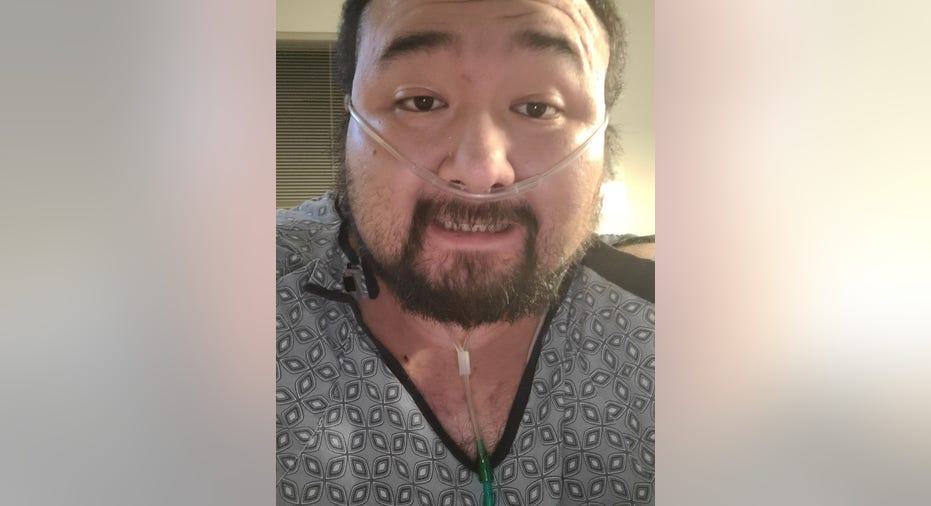COVID-19 patients to face medical debt burden as insurance plans stop cost sharing waivers
Average cost of COVID-19 hospitalization is around $20,000, with average out-of-pocket costs around $1,300 per patient
Digital health company aims to address nursing shortage
Nomad Health co-founder and CEO Alexi Nazem discusses vaccines, health care staff and his company.
As a growing number of insurance plans are canceling COVID-19 cost-sharing waivers amid an increase in vaccinations, more patients will be left to shoulder the brunt of the medical debt associated with catching the virus.
AT-HOME COVID-19 TESTS RECALLED OVER FALSE POSITIVES
The Kaiser Family Foundation estimates that approximately 72% of the two largest insurers in each state and Washington, D.C., or 102 health plans, are no longer waiving out-of-pocket costs for COVID-19 treatment, while another 10% of plans will phase out waivers by the end of October and another 12% will phase out waivers by the end of 2021.
Though real-time data on the cost of COVID-19 hospitalizations is not publicly available, studies suggest that the average total cost is likely around $20,000. One report by the Centers for Medicare and Medicaid Service found that Medicare fee-for-service COVID-19 hospitalizations averaged approximately $24,033, while a study published by the American College of Physicians found that the mean COVID-19 hospitalization cost for Medicare fee-for-service enrollees was $21,752.
KFF estimates that the average out-of-pocket cost for COVID-19 patients is about $1,300 on average, based on data for the cost of similar care for pneumonia cases. In addition, the nonprofit finds that the preventable costs of treating unvaccinated COVID-19 patients in hospitals between June and August hit an estimated $5.7 billion.
KAISER PERMANENTE SUSPENDS MORE THAN 2,200 WORKERS FOR IGNORING VACCINE MANDATE
COVID-19 survivor and Las Vegas resident Kenneth Fuchigami told FOX Business that his financial troubles started after catching the virus in December 2020.
"My wife was the one got COVID first. I didn't really believe in the sickness," Fuchigami said. "So when she had it, I was going to work and one day I wanted to kiss her goodbye. She told me not to do it, but I did it anyway. And the next day, I started having symptoms and I was, like, freaked out that I got it that fast."
Within a week, his wife's condition improved, but his own was worsening.
"It went to a point where I felt like I couldn't breathe. I felt like I was breathing through a straw," he continued. "So then I told my wife, you know, just take me to the emergency room. When she dropped me off at the front, I felt like I couldn't even walk and when I got to the emergency room, there's a big line, right? There's a lot of people in the waiting room. I guess I was so bad that they took me in right away."
Fuchigami realized COVID-19 was no joke as he stayed in the intensive care unit for about a month. Nearly a year later, Fuchigami depends on a respirator and supplemental oxygen tank to breathe after severe damage to his lungs and has been saddled with thousands of dollars in medical debt, with bills ranging from as low as $25 to as high as $70,000.
"It's been ridiculous," he said. "After I got $70,000, I started getting billed $1,000 here, $1,000 there, $2,000 here, $800 here. And then the collectors started calling."
CLICK HERE TO READ MORE ON FOX BUSINESS
Krutika Amin, Kaiser Family Foundation's associate director for the program on the ACA, told FOX Business that the best course of action for patients saddled with COVID-19 medical debt is to call their hospitals and insurance providers to see if they can negotiate bill reductions.
"Under the CARES Act, Congress provided relief funds and the hospitals that are receiving these funds are not allowed to surprise bill patients for anything that their insurance company might not be paying and whatever the hospital is charging if the hospital is out of network," Amin explained. "So some of those surprise bills might be mitigated, but it never hurts patients to try to call their hospitals or plans or to try to negotiate their costs down."
However, Fuchigami, who lost his insurance coverage after being laid off from his job, is no longer eligible for unemployment and cannot afford the payment plan established by the hospital.
"I asked if there's a payment plan that I can set up to where I can pay like little by little," he said. "The lady said, ‘Oh yeah, we could do that.’ So I said, 'Well, what's the lowest that I can pay?' She goes, 'You're going to have to pay about $7,000 a month.'"
Fuchigami has since filed for disability and welfare but says he has received "zero help." He's also resorted to rationing his pills after his medication costs have jumped from $2 and $60 to $500 and $600.
"I'm stuck with all these bills," he said. "I don't even try to think about it anymore because it's just stressing me out."
In the meantime, Fuchigami launched a GoFundMe to cover his expenses. The fundraiser has raised nearly $5,000 toward its $6,000 goal.



























